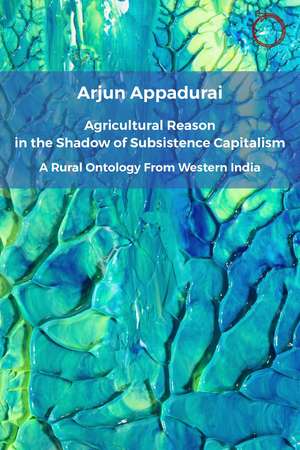Agricultural Reason in the Shadow of Subsistence Capitalism: A Rural Ontology from Western India
Autor Arjun Appaduraien Limba Engleză Paperback – 26 aug 2024
This collection of essays by Arjun Appadurai based on his fieldwork in rural Maharashtra, India, in the early 1980s is one of the few anthropological treatments of agricultural reasoning. In conversation with agronomists, economists, and development anthropologists, the essays explore the ways agricultural technologies, changes in how surface wells are dug and managed, the provision and sharing of food and management of time, issues of scale in studying rural lives, and how local knowledge is formed and transformed reveal the distinctive character of rural Indian sociality. Locating these features in the context of “subsistence capitalism,” Appadurai draws our attention to the importance of relational practices and the pull of autonomy. These essays offer a close look at an agrarian society at the pivotal moment of its encounter with capitalist transformation and study ideas of measurement, sociality, and independence.
Preț: 152.21 lei
Nou
Puncte Express: 228
Preț estimativ în valută:
29.12€ • 30.49$ • 24.10£
29.12€ • 30.49$ • 24.10£
Carte disponibilă
Livrare economică 17-31 martie
Livrare express 28 februarie-06 martie pentru 15.42 lei
Preluare comenzi: 021 569.72.76
Specificații
ISBN-13: 9781914363061
ISBN-10: 191436306X
Pagini: 158
Dimensiuni: 152 x 229 x 13 mm
Greutate: 0.14 kg
Editura: HAU
Colecția HAU
ISBN-10: 191436306X
Pagini: 158
Dimensiuni: 152 x 229 x 13 mm
Greutate: 0.14 kg
Editura: HAU
Colecția HAU
Notă biografică
Arjun Appadurai is professor emeritus of media, culture, and communication at New York University. He is the author of The Social Life of Things: Commodities in Cultural Perspective, Modernity At Large: Cultural Dimensions of Globalization, Fear of Small Numbers: An Essay on the Geography of Anger, The Future as Cultural Fact: Essays on the Global Condition, and Banking on Words: The Failure of Language in the Age of Derivative Finance.
Cuprins
Acknowledgments
Introduction
chapter 1 Andaj
chapter 2 Small-Scale Techniques and Large-Scale Objectives
chapter 3 Wells in Western India: Irrigation and Cooperation in an Agricultural Society
chapter 4 Dietary Improvisation in an Agricultural Economy
chapter 5 Technology and the Reproduction of Values in Rural
Western India
References
Index
Introduction
chapter 1 Andaj
chapter 2 Small-Scale Techniques and Large-Scale Objectives
chapter 3 Wells in Western India: Irrigation and Cooperation in an Agricultural Society
chapter 4 Dietary Improvisation in an Agricultural Economy
chapter 5 Technology and the Reproduction of Values in Rural
Western India
References
Index
Recenzii
“Before his paradigm-shattering work on globalization, Arjun Appadurai wrote some scintillating essays on agriculture in India. Collected together for the first time, these essays represent a magnificent contribution to agrarian studies and rurality, and demonstrate the power of cultural analysis for understanding the everyday activities of food production and distribution.”
“Appadurai makes a bold and original case for agricultural reason through a densely textured study of what he calls subsistence capitalism in the villages of western India. In these essays, he rescues peasant rationality from the condescension of those who would limit it to the mere reproduction of local cosmologies. By closely looking at the sociality that undergirds social hierarchy, he shows us how peasants generate everyday concepts and a theory of relationality as much as techniques of production. This book brings peasants back into discussions of contemporary capitalism, not as detritus but as conscious actors. A wonderful and timely publication.”
“One of anthropology’s most distinguished practitioners returns to his fieldwork in rural India to reflect more broadly on the nature of ‘subsistence capitalism,’ in whose shadow growing numbers of the world’s population must live. In such precarious conditions, he reminds us, people seek their bulwark—and their measure of value—in an everyday give-and-take, a ‘stubborn sociality,’ that is their hedge against immiseration. The penetrating insights offered here are as relevant to the poor of post-industrial cities today as they were to farmers in rural Maharashtra. A scintillating read!”
